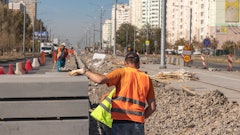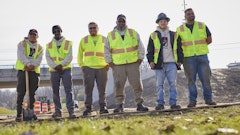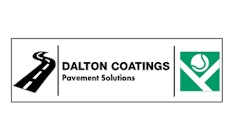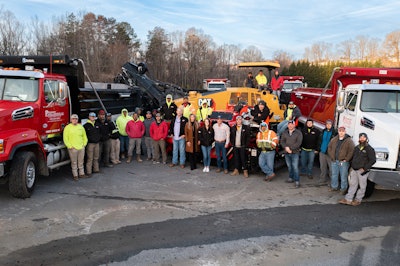
In 1991, when David McGee got his first job in the asphalt industry, he had little construction experience. After collecting unemployment due to seasonal layoffs at UPS, he started with a paving company as a shovel man for $60 a day. David and his wife, Paige, were newlyweds just trying to make ends meet.
"I have a wife and daughter to support while making only $60 a day shoveling asphalt," said McGee. "We weren't even working every day at the time."
The paving company he was working for did not have a large operation. They used a single-axle truck, and mostly did small repairs. He tried to absorb and apply every detail possible. The thought of branching out and working for himself became more appealing each day.
"I always had it in my mind to someday start my own business," recalled McGee of that time. Then an opportunity presented itself that he was not expecting.
During a visit with his wife's grandparents, her grandfather asked him the question all good patriarchs do to those who marry into their family. Granddaddy wanted to know how young David was planning to provide for his granddaughter and great granddaughter.
"I told him what I was doing at the time, working with that crew, but I told him I was thinking of starting my own paving business," explained McGee.
The next following day, her grandfather unexpectedly hands him a check for $5,000 as a seed investment into David's idea.
"It shocked the whole family, because he'd never done something like this ever," said McGee. "I told him that I didn't want his money, that it I didn't tell him about my idea to get his money. It blew my mind. He wouldn't take no for an answer."
The Early Days and The Good Ole Days
The first thing David did was take the investment from his wife's grandfather and use $4,000 of it as a down payment on a single-axle dump truck of his own. The other $1,000 he used to buy shovels, lutes, a chain dog and a trailer to haul everything around.
"Then I went and rented a little roller, and just started knocking on doors with some business cards I had. That was 1991," said McGee. "As doors would open, we just walked through them slowly but surely. That was 33 years ago."
And thus, Piedmont Paving Inc was born. However, that first year in business came with some serious challenges.
"I was so desperate one week, I didn't have any money after I'd paid all the bills," McGee remembered. "I went out knocking on doors, and one lady had a pothole in her driveway. She asked, 'How much?' and I told her $25. After paying for materials and my brother for some help, I kept $15 of it for myself. I thought I'd really done something that day. I was really proud of myself, and probably went and bought something for dinner that night."
It was touch-and-go for the fledgling business, but when things would get really tight, another job would seemingly come along. The phone would ring, David would meet someone who needed work, or he'd network with people who could help him expand his reach.
In 1992, he connected with a local broker who helped him expand his pavement maintenance work including the addition of patching, sealcoating, and striping. These changes helped the business start to really grow. It took about two years to pay back that original $5,000 loan, and things continued to accelerate from there.
Piedmont Paving's first paver was a LeeBoy drag-box.
"It would actually put down a really good mat," McGee explained. "But I mean, you work your butt off with one of those. If you put down 30 ton with that, you shoveled 15 of it by hand."
Eventually, he ran into a job the drag-box couldn't easily manage, and from then on, they gradually upgraded their machines and their capabilities, one piece at a time.
Staying On The Right Track
In the mid-1990s, the greater Greensboro, N.C. area saw a construction boom, and with it, David McGee and his company grew, too.
"I remember I walked into this general contractor's office and asked if I could do some work for them," McGee recalled. "The guy there handed me a set of plans with a scale. I didn't know what I was looking at. I never looked at a set of plans before in my life."
"So, I went and bought myself a scale, went home, sat down, and tried to do a take-off from that set of plans. I didn't know what in the world I was doing," He said. "But I sent over the price to him, and we ended up getting the job. Before you knew it, we were doing a lot of new construction from then on."
Those were some of the company's early signs that they were breaking through and making real headway in the industry. Throughout the mid-to-late 1990s, the company saw large gains working as a sub for various large GCs, doing bigger and bigger jobs.
"We just got better as we went," said McGee. "But we had to learn everything the hard way. I didn't have anyone to teach me. So sometimes I would go out and watch the big pavers in the area, pull over to the side of the road when they were working, and watch how they did things."
As Piedmont turned the corner into the new century, it felt like they were starting to be recognized in their area, and their footprint was growing. In the midst of all this, David and his wife added three more children to the mix, and the pair worked together to continue forming the life they envisioned for themselves.
"I was actually on the paver every time it moved up until about eight years ago," said McGee. "I look back on it all now, and I'm not sure how we did it all, to be honest. I believe around 1996, I hired Jay Brewer to start running the paver for me, but I still sat on the dummy side all day, and I'd be on the phone with clients, our project managers, or I'd be doing things like payroll, all from the paver."
For years he continued to handle all the paperwork on his own, but still managed to find time to coach his kids’ after school sports activities, making whatever sacrifices he had to along the way.
"I've always been fortunate to have really good people," McGee said, reflecting on how so much was able to be accomplished over the years. "Between Mark Rountree, Matt Weiss, Jay Brewer, William Dixon, Jose Beltran, Aaron Falstreau, and my kids, who all work for me now, I've been able to start stepping away a little bit."
Curveballs, Concrete, and Crushing
Mark Rountree came on board in 2002 to take over estimating. With his extensive construction knowledge and a drive to expand into other areas of site work, the concrete division of Piedmont Paving was born in 2004. Aaron Falstreau was brought on as the concrete division’s project manager in 2007, and has been with the company ever since.
Near the end of the early 2000s, Piedmont faced the same challenges that plagued the rest of the country. The economic downturn in 2008 was the most precarious time for David and the company since their first year in business. However, the adversity and challenges that they faced during this stressful period resulted in the development of one of their most unique assets.
"It was like someone walked into our offices one day, turned the lights out and said that's it, you're done," said McGee. "It was bad. Eventually, I sat down with Mark and told him we needed to switch gears, because there wasn't enough new construction to sustain things. We needed to get back into the maintenance side of things."
Piedmont was previously subbing out a lot of their striping and sealcoating, so they went and purchased some new equipment and brought all those services back in-house. At the same time, they became DOT certified in order to bid on government projects nearby. However, it was David's foresight that helped them navigate these tough times best.
While he noticed other contractors making moves that indicated a short-term recession and a quick bounce back to normalcy, he prepared for a longer drought. His instincts turned out to be much closer to reality, and it helped them emerge on the other side as a stronger, healthier, and more resilient company.
"We'd get calls all the time about asphalt millings. Anytime we had a milling job, I'd have people wanting to pay to take them off our hands, right? Or we'd haul them to a plant, and we never get a dime for it," said McGee. "We were milling up so much asphalt and digging up concrete, that I thought we ought to start crushing it up ourselves, and turn it around to sell it. We started looking for a piece of property, got ourselves a Kleeman crusher, and now we have about 30 customers in-and-out every day buying crushed asphalt and concrete. As fast as we can crush it, we sell it, and that is how Piedmont Recycling was born."
The Next Generation
From David's perspective, he felt as though his kids always wanted to be a part of the business one day. They would take to it naturally over the years, working during school breaks and summertime jobs. With two sons, Matthew and Joshua, and two daughters, Ashley and Molly, everyone plays a role in the company's day-to-day operations.
David's daughters manage the office, his sons lead the operation crews, and his brother-in-law handles estimating and project management. His philosophy on working with family is simple: As long as everyone is working together without any drama, things will continue on just fine.
Piedmont is currently averaging 40 employees, and somewhere in the realm of fifty pieces of heavy equipment on their yard. True to their roots, they are still running LeeBoy pavers to this day.
With such humble beginnings, there’s a lot to be said about where hard work can take a company. What strategies can be ascribed to growing during difficult times, and surviving changes in the industry and the economy while others haven't? When asked about his views and perspectives on business growth, McGee reflected honestly.
"I'm 60 years old, and I'm not done yet, by any means," McGee said. "But I don't think I've ever sat down and set up a specific plan about how to grow. I don't remember ever brainstorming with my guys a growth program. We've been extremely fortunate."
As the industry changes, McGee doesn't see a future where the family isn't still at the helm. Others in the area have taken outside investment, scooped up by outside equity, but as long as his kids want to do it -- it will stay in their hands.
"Dad has worked hard for what he's given us," said Matt McGee. "I would say one of my biggest things is a desire to not let him down, you know? I want to take care of what he's blessed us with. There is a little pressure to succeed in continuing a legacy, I would say."
Matt's brother, Josh, feels a similar compulsion, but, albeit, from a slightly different angle.
"I'm really competitive, and I get that from my dad," said Joshua. "I like this work, because at the end of a job you are rewarded right away. You're able to see how hard you worked. I pride myself on our work, what we do, and being the best. Even if I was to do anything besides this, I'd want that same feeling. Asphalt is kind of special."
"I know this," replied David. "My kids are better than me in every way. When I got started, I couldn't do anything. They've learned how to do it all, and then some. There's all this new technology and tools and stuff available now, but we never had any of that. Now there's so much technology on these jobs that I couldn't run it even if I tried!"
Gratitude And Hard Work
The thing about the Contractor of the Year is that it's an award that takes several things into account, not just the size of your business, or the number next to a sales report. In this industry, reputation is something you build over time, and your character sticks with you.
While David didn't start out with someone or somewhere to turn to educate himself on the tricks of the trade, having to learn the hardest way what he needed to know, Piedmont is a name you hear from other contractors in the industry when they talk about needing help and getting it.
In this way, the McGee clan exemplifies the best parts of the asphalt pavement maintenance industry. They serve their customers to the highest level of quality, and they serve the industry by sharing the knowledge they have with others. Their videos and their social media presence offer more than just marketing tools, they educate and they demystify the work for clients and those outside the industry itself.
"I want to make sure that people understand that I only think we were able to do all this because of the good people we had helping us," David emphasized. "We aren't perfect, and in 34 years we've made mistakes for sure, but I believe we have given our best on every single job we show up on. We leave every jobsite confident we've done our best."




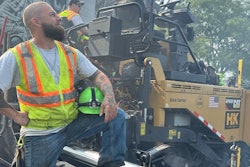
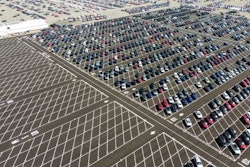
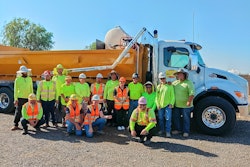
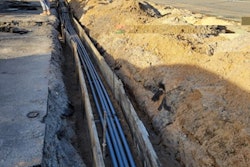

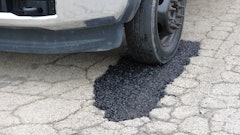

![Lee Boy Facility 2025 17 Use[16]](https://img.forconstructionpros.com/mindful/acbm/workspaces/default/uploads/2025/09/leeboy-facility-2025-17-use16.AbONDzEzbV.jpg?ar=16%3A9&auto=format%2Ccompress&fit=crop&h=135&q=70&w=240)


